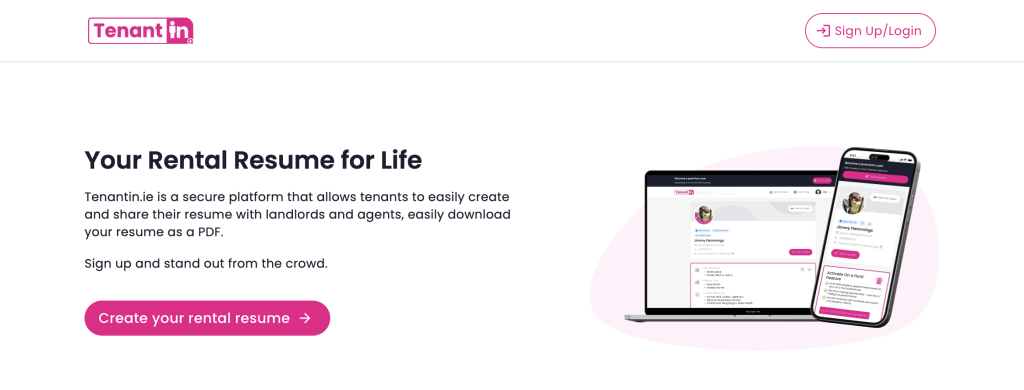Relocating to Dublin for work can be exciting, but finding a suitable place to live in Ireland’s capital is no small feat. With high demand, rising rental prices, and fierce competition, it’s essential to prepare in advance and approach the rental process strategically. Whether you’re moving from within Ireland or coming from abroad, these practical renting tips will help you settle smoothly and avoid common pitfalls. Plus, we’ll show you how Tenantin.ie can streamline your rental journey and increase your chances of securing a home in Dublin.
Understanding the Dublin rental market
The Dublin rental market is one of the most competitive in Ireland. With a large number of professionals, students, and families all seeking housing in the same areas, rental properties are often snapped up within days—or even hours—of being listed. Rent prices in popular neighbourhoods like Ranelagh, Ballsbridge, Drumcondra, and Dublin 8 continue to rise, with limited availability across all types of accommodation. Therefore, it’s crucial to move quickly, present yourself as a reliable tenant, and have all your documentation in order before you start viewing properties.
Start your search early and be realistic
One of the most important steps in relocating to Dublin is starting your rental search as early as possible. While some people wait until they’ve already arrived in the city, beginning your search a few weeks in advance can give you a valuable head start. Set clear expectations based on your budget, preferred location, and commute to work. It’s not always feasible to find a dream apartment in the city centre within a modest budget, so be prepared to compromise on size, location, or amenities.
Online platforms like FindQo.ie list available properties, but demand often outweighs supply. That’s where having an edge can make a real difference—and this is where Tenantin.ie comes into play.
How Tenantin.ie simplifies your move
Tenantin.ie is a digital rental profile platform designed specifically for the Irish rental market. If you’re moving to Dublin for work, setting up a Tenantin profile is one of the smartest steps you can take. Rather than sending disorganised messages or repeatedly attaching your details to multiple inquiries, you can create a rental resume—a professional, centralised tenant profile that includes your references, proof of employment, ID, rental history, and more.
When landlords receive dozens or even hundreds of messages for a single property, a well-organised and verified Tenantin profile helps you stand out. It saves time for both you and the landlord, increasing your chances of being shortlisted for viewings and applications. For those actively searching, activating the “On a Hunt” feature on Tenantin.ie automatically connects your profile with suitable listings from FindQo.ie, sending out applications on your behalf and delivering daily alerts straight to your inbox. This is ideal for busy professionals who don’t have time to trawl through listings every day.
Have your documentation ready
In Dublin’s fast-paced rental scene, delays can cost you the property. Be ready to act fast once you find a place you like. This means preparing the following documentation in advance:
- Proof of employment or job offer
- Photo ID (passport or driver’s licence)
- Previous landlord references
- Bank statements or payslips showing your ability to pay rent
- PPS number (Personal Public Service number)
With Tenantin.ie, you can securely upload and store these documents in your profile, ready to be shared at the click of a button when applying for a property. This speeds up the application process and shows landlords that you’re organised and serious.
Consider different neighbourhoods
If you’re unfamiliar with Dublin, it’s worth exploring a variety of neighbourhoods beyond the city centre. Areas like Rathmines, Phibsborough, Clontarf, and Stoneybatter offer great amenities, public transport links, and community feel—often at lower rent than central postcodes. Proximity to Luas or DART lines can significantly reduce your commute time, so check transport options before committing to a lease.
Those working in tech, finance, or corporate roles may also find good accommodation in South Dublin suburbs such as Sandyford, Dundrum, or Stillorgan, which are well connected by public transport and close to major business hubs. Northern districts like Swords or Malahide can be appealing for those commuting to north Dublin business parks or the airport.
Beware of rental scams
Unfortunately, rental scams are still a concern in Ireland, especially for people relocating from abroad. Always verify that the landlord or letting agent is legitimate before sending money or signing anything. Never agree to transfer funds without seeing the property in person (or through a verified virtual tour), and avoid deals that seem “too good to be true.” Using trusted platforms like FindQo.ie, and applying via Tenantin.ie, can help ensure you’re dealing with genuine listings and landlords.
Understand your rights as a tenant
As a tenant in Ireland, you have legal protections under the Residential Tenancies Act. Key rights include:
- A minimum 90-day notice period if the landlord wants to end the tenancy
- The right to a rent book or receipt for payments
- The right to privacy (landlords must give 24 hours’ notice before visits)
- The right to a refund of your deposit, minus any fair wear and tear
Before signing a lease, read the agreement carefully. Make sure it outlines the rent amount, payment dates, duration, and any specific terms. If you’re unsure, the Residential Tenancies Board (RTB.ie) offers guidance on tenant rights and responsibilities.
Budget for upfront and ongoing costs
In Dublin, most landlords will require a security deposit (usually one month’s rent) and the first month’s rent upfront. Be sure to factor in additional costs like utilities (electricity, gas, broadband), TV licence fees, and contents insurance. Also, if you’re moving into a furnished apartment, check what’s included—some rentals may not come with basics like a microwave or washing machine.
To save time and prevent surprises, the Tenantin.ie profile includes a section for listing your rental preferences, such as required amenities, max budget, and desired move-in date. This helps match you to the most suitable listings while avoiding properties that don’t meet your needs.
Viewings: be punctual and professional
Once you secure a viewing, treat it like a mini job interview. Arrive on time, dress appropriately, and be polite to the current tenant or landlord. Bring a copy of your Tenantin.ie profile link, or have it ready to share digitally. Be prepared to express your interest on the spot, as landlords often make decisions quickly.
Ask smart questions about the lease length, utility costs, and maintenance procedures. If the property ticks your boxes, don’t wait—submit your application immediately, ideally with your Tenantin.ie profile so everything is professionally packaged.
Make the most of local support
For those moving from abroad, the relocation process can be overwhelming. Local Facebook groups (like “Renting in Dublin” or “Irish Expats in Dublin”), LinkedIn groups, and tenant forums can be great sources of advice and leads. Some employers also offer relocation support or temporary accommodation to help new hires settle in.
If you’re already in Ireland but relocating from another county, platforms like Tenantin.ie can still be a major asset, especially if you’re unable to attend every viewing in person. A strong digital profile can help landlords take your application seriously, even if you’re viewing remotely.

Relocating to Dublin for work doesn’t have to be stressful—if you approach it with preparation, a good understanding of the market, and the right tools. From having your documents ready and knowing the best neighbourhoods to applying with confidence, every step counts. Tenantin.ie takes much of the hassle out of the process, offering a smarter way to present yourself to landlords, receive tailored alerts, and secure a place to live in Ireland’s competitive capital.
If you’re planning a move soon, start building your Tenantin profile today—it could be the edge you need to turn your relocation into a successful and stress-free Dublin experience.
